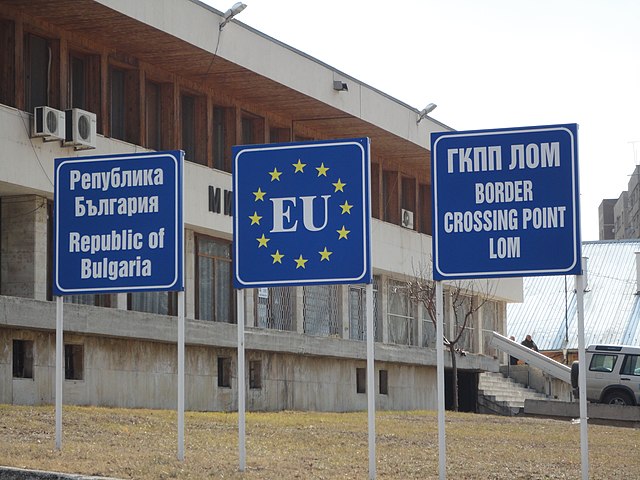Photo: Border crossing between Romania and Bulgaria near Lom - Wikimedia Commons
Bulgaria, Romania and Croatia were all set to join the Schengen zone on 1 January 2023, which allows free movement of people and goods between members. However, in November 2022, the Netherlands and Austria vetoed Bulgaria's accession, Austria alone also for Romania. Croatia did join. Since EU accession in 2007, the countries have been under EU surveillance on the rule of law and the fight against corruption and organised crime. The fact that rule of law reforms would not yet be fully implemented was a stumbling block for the Netherlands, which blocked Bulgaria's accession to the Schengen zone in November 2022. Last September 15, this so-called 'surveillance regime' on Bulgaria and Romania ended. Despite the European Commission's verdict that Bulgaria is ready to join "Schengen", the Netherlands stands firm and argues that some important steps still need to be taken.
Dwarsligger Netherlands
The Netherlands believes Bulgarian border controls are still substandard. Bulgaria borders non-EU country Turkey, which would form a new part of the Schengen zone's external border. Migration rates in Europe on the rise and countries like the Netherlands fear that Bulgaria is unable to adequately guard its border. This is despite the fact that there is an 'asylum crisis' in the Netherlands itself, partly due to years of cuts in asylum reception. The Netherlands points to Bulgaria's lack of ability when it comes to dealing with asylum seekers and fighting corruption. However, these are issues that do not belong to one country - channelling migration flows in the right direction is, in all things, a matter for the entire Union. The Dutch criticism is indicative of European frustration at not being able to get migration under control. Sustainable policy on migration is a long time coming, while the EU is still convinced it can create a "Fortress Europe". Membership of Bulgaria, according to the Netherlands, would not make this fortress stronger, but rather more vulnerable. Hermetically closing Europe's external borders should lead to a controllable situation as far as migration is concerned, even though the opposite has been proven and leads to human rights violations and life-threatening situations at the border.
Expansion of the Schengen zone is precisely the opportunity for greater cooperation. Indeed, Europe-wide issues require Europe-wide solutions. The European Commission therefore argues that Bulgaria meets all criteria To join. "Bulgaria has implemented a strong border management system with efficient border surveillance and systematic border checks. Combating cross-border crime is prioritised through international police cooperation, including with Europol." Bulgaria has taken action over the past year to, among other things counter organised human trafficking and ensure EU money is spent effectively.
The undiminished importance of enlargement
It is vital that Bulgaria (and Romania) join the Schengen zone soon. Socially and economically, the current situation disadvantages people and businesses. It leads to delays at the border, bureaucratic difficulties and extra costs. Financial burdens fall on the local economy. Free movement of goods is hampered, also limiting the EU internal market. For these countries' economies to develop and further connect with the rest of Europe, they need to be able to participate fully in the single market to strengthen their own economies.
Besides damaging the economy, Romania and Bulgaria's exclusion also negatively impacts European climate goals and the local environment. Waiting vehicles at the border create air pollution in the region, deteriorating the health of drivers and local residents. It also causes annual emissions of 46,000 tonnes of CO2 emissions at the border.
Finally, excluding Bulgaria from "Schengen" will further create anti-EU sentiment and propaganda. Pro-Russian, Euro-sceptic parties are fuelled by the current stalemate and are gaining increasing support in recent years. Excluding Bulgaria frustrates the population and creates internal divisions within the EU - divisiveness that a country like Russia unalterably preys on. The EU aims to spread European values across the continent, but is cutting itself in half by concerns around migration - thereby only further fuelling anti-democratic forces. The principles on which the EU was built - freedom, equality and the rule of law - are undermined when certain EU citizens are treated as second-class members of the EU.
Bulgaria's exclusion is not only symbolic, it causes real costs for citizens and businesses, contributing to socio-economic inequalities as well as environmental problems. Schengen is thus not a migration issue, but one of identity. It is about ending remaining physical restrictions and feeling European. The Netherlands must ask itself whether we want a two-tier European Union, or an inclusive, united one, based on its founding principles.





